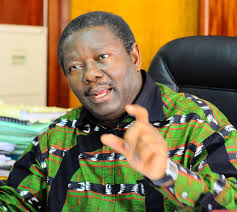Rostec pullout probably good for Uganda oil programme
 Energy PS Kabagambe-Kaliisa
Energy PS Kabagambe-Kaliisa
 KAMPALA, JULY 02 – The news that Russian state conglomerate RT Global Resources had dropped the bid to lead the development of Uganda’s oil refinery, for many adds misery to a season of despair. At a time of so much uncertainty over the global economy, depressed domestic growth and so many pending public projects, few things promised so much near term relief for Uganda than getting atleast oen aspect of her long delayed oil programme moving.
KAMPALA, JULY 02 – The news that Russian state conglomerate RT Global Resources had dropped the bid to lead the development of Uganda’s oil refinery, for many adds misery to a season of despair. At a time of so much uncertainty over the global economy, depressed domestic growth and so many pending public projects, few things promised so much near term relief for Uganda than getting atleast oen aspect of her long delayed oil programme moving.
Yet with hindsight, the present outcome was largely anticipated and that was why the Ugandan government never quite closed the door on the closest losing bidder. South Korea’s SK Engineering & Construction. It also explains the recent back to back visits to Uganda by the Turkish and South Korean heads of state. South Korea is playing catch-up on the African pie while Turkey, with a widening current account deficit has been for years looking at Africa for trade opportunities.
Depending on Russia to develop the refinery was always going to be a high risk gamble for Uganda. As it reasserts its global presence, Russia is increasingly the target of one spurious claim or another by western governments that conveniently hold a stranglehold over global trade. So the chances that the refinery would be the grass that suffers when the elephants tumbled was always a real, though unwelcome possibility.
In that respect, Uganda should perhaps be happy with the way things have turned out. With the experience the negotiating teams have gained from dealing with the Russians, the country should be able to wring a better deal from the South Koreans. But our bureaucrats will need to believe in themselves and remember that nobody is doing Uganda a favour, it is just business and you gun for the best deal for yourself.
On the upside, the South Koreans bring on board a more ethical practice and access to prized western technology that offers better conversion rates and a smaller environmental footprint. This is also happening at a time when the pieces of Uganda’s institutional jigsaw are falling into place. The National Oil Company has a CEO and recruitment of leadership for the Petroleum Authority is almost complete. This creates propitious conditions for better oversight of the oil sectors development process and better accountability to the public by the state over decisions in the oil sector.
We should also take some pride in the fact that the Ministry of Energy has been able to call Rosec’s bluff. In the statement announcing the decision to terminate negotiations, Permanent Secretary Dr. Fred Kabagambe-Kaliisa pointed to the fact that the government had been in negotiations with the RT-Global Resources Consortium for the last 14 months. And yet after final agreement was arrived at in May; and just prior to signature, RT-Global Resources returned with additional demands, effectively trying to reopen negotiations on closed issues. The Ministry of energy said no. We hope that this episode signals the receding role of politics in key infrastructure projects. If we are going to roast the technocrats for messing up affairs, then for God’s sake let them carry their cross.

 African Heads of state head to South Korea next week for Summit talks
African Heads of state head to South Korea next week for Summit talks
 Trading leads as main source of income for Ugandans
Trading leads as main source of income for Ugandans
 New leadership for bankers’ umbrella as total assets top $12 billion
New leadership for bankers’ umbrella as total assets top $12 billion
 Brussels Airlines to announce Nairobi service
Brussels Airlines to announce Nairobi service
 SITA promises enhanced travel experience after Materna acquisition
SITA promises enhanced travel experience after Materna acquisition
 Saudia’s 105 aircraft order stretches A320neo lead over rival Max
Saudia’s 105 aircraft order stretches A320neo lead over rival Max
